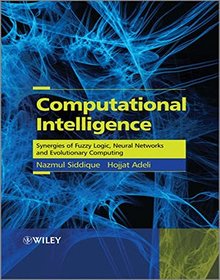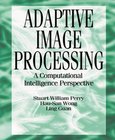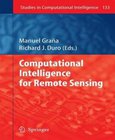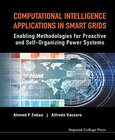Computational Intelligence
Synergies of Fuzzy Logic, Neural Networks and Evolutionary Computing

Book Details:
| Publisher: | Wiley-Blackwell |
| Series: | Wiley |
| Author: | Nazmul Siddique |
| Edition: | 1 |
| ISBN-10: | 1118337840 |
| ISBN-13: | 9781118337844 |
| Pages: | 532 |
| Published: | May 10 2013 |
| Posted: | May 17 2017 |
| Language: | English |
| Book format: | |
| Book size: | 3.82 MB |
Book Description:
Computational Intelligence: Synergies of Fuzzy Logic, Neural Networks and Evolutionary Computing presents an introduction to some of the cutting edge technological paradigms under the umbrella of computational intelligence. Computational intelligence schemes are investigated with the development of a suitable framework for fuzzy logic, neural networks and evolutionary computing, neurofuzzy systems, evolutionaryfuzzy systems and evolutionary neural systems. Applications to linear and nonlinear systems are discussed with examples. Key features: Covers all the aspects of fuzzy, neural and evolutionary approaches with worked out examples, MATLAB exercises and applications in each chapter Presents the synergies of technologies of computational intelligence such as evolutionary fuzzy neural fuzzy and evolutionary neural systems Considers real world problems in the domain of systems modelling, control and optimization Contains a foreword written by Lotfi Zadeh Computational Intelligence: Synergies of Fuzzy Logic, Neural Networks and Evolutionary Computing is an ideal text for final year undergraduate, postgraduate and research students in electrical, control, computer, industrial and manufacturing engineering.
Download Link:
Related Books:
Adaptive Image Processing
A Computational Intelligence Perspective
Adaptive image processing is one of the most important techniques in visual information processing, especially in early vision such as image restoration, filtering, enhancement, and segmentation. While existing books present some important aspects of the issue, there is not a single book that treats this problem from a viewpoint that is directly linked to human perception - until now. This reference treats adaptive image processing from a computational intelligence viewpoint, systematically and successfully, from theory to applications, using the synergies of neural networks, fuzzy logic, and evolutionary computation. Based on the fundamentals of human perception, this book gives a detailed account of computational intelligence methods and algorithms...
Computational Intelligence for Remote Sensing
This book is a composition of different points of view regarding the application of Computational Intelligence techniques and methods to Remote Sensing data and applications. It is the general consensus that classification, its related data processing, and global optimization methods are core topics of Computational Intelligence. Much of the content of the book is devoted to image segmentation and recognition, using diverse tools from different areas of the Computational Intelligence field, ranging from Artificial Neural Networks to Markov Random Field modeling. The book covers a broad range of topics, starting from the hardware design of hyperspectral sensors, and data handling problems, namely data compression and watermarking issues, as well as au...
Automated Design of Analog and High-frequency Circuits
A Computational Intelligence Approach
Computational intelligence techniques are becoming more and more important for automated problem solving nowadays. Due to the growing complexity of industrial applications and the increasingly tight time-to-market requirements, the time available for thorough problem analysis and development of tailored solution methods is decreasing. There is no doubt that this trend will continue in the foreseeable future. Hence, it is not surprising that robust and general automated problem solving methods with satisfactory performance are needed....
Computational Intelligence Applications in Smart Grids
Enabling Methodologies for Proactive and Self-Organizing Power Systems
This book considers the emerging technologies and methodologies of the application of computational intelligence to smart grids. From a conceptual point of view, the smart grid is the convergence of information and operational technologies applied to the electric grid, allowing sustainable options to customers and improved levels of security. Smart grid technologies include advanced sensing systems, two-way high-speed communications, monitoring and enterprise analysis software, and related services used to obtain location-specific and real-time actionable data for the provision of enhanced services for both system operators (i.e. distribution automation, asset management, advanced metering infrastructure) and end-users (i.e. demand side management, d...
2007 - 2021 © eBooks-IT.org




